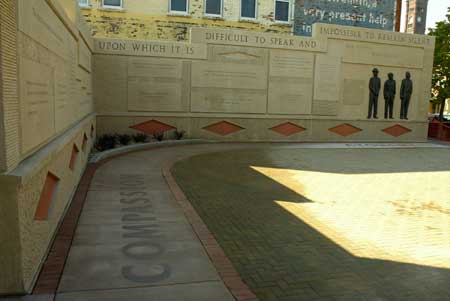Elmer Jackson
Share
Explore Our Galleries
Newest Exhibit
Breaking News!
Today's news and culture by Black and other reporters in the Black and mainstream media.
Ways to Support ABHM?
Murdered in: Duluth | June 15, 1920
Elmer Jackson was born on April 19, 1897, in Pennytown, Missouri. Pennytown was one of the very first freed slave settlements where former slaves purchased, held title to, and lived upon their own land.

The Clayton Jackson McGhie Memorial in Duluth, Minnesota, honors the victims of a lynching there in 1920.
Elmer was a son to Clifton and Rachel (Williams) Jackson, and brother to Clifton Jr., Sarah, Mack and Rachel. It is believed that Elmer and his family moved from Pennytown to Topeka, Kansas, sometime around 1916. There, Elmer and his father Clifton worked at the Santa Fe locomotive shops. Both Elmer and his brother Mack occasionally left home to go and work for the traveling circus companies. The 1920 John Robinson Show would be the last one Elmer Jackson would ever work.
In 2003 the community of Duluth unveiled the Clayton Jackson McGhie Memorial. At the time it was erected, it was the most significant memorial to lynching victims in the United States.
Contributed by Warren Read, great-grandson of one of the Duluth lynchers.









Comments Are Welcome
Note: We moderate submissions in order to create a space for meaningful dialogue, a space where museum visitors – adults and youth –– can exchange informed, thoughtful, and relevant comments that add value to our exhibits.
Racial slurs, personal attacks, obscenity, profanity, and SHOUTING do not meet the above standard. Such comments are posted in the exhibit Hateful Speech. Commercial promotions, impersonations, and incoherent comments likewise fail to meet our goals, so will not be posted. Submissions longer than 120 words will be shortened.
See our full Comments Policy here.